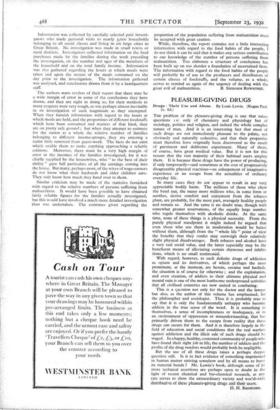PLEASURE-GIVING DRUGS
Tim problem of the pleasure-giving drug is one that raises questions r o: only of chemistry and physiology but of sociology, politics and religion, and indeed the whole complex nature of man. .And it is an interesting fact that most of such drugs are not immediately pleasant to the palate, not obviously and naturally seductive, and that their properties must therefore have originally been discovered as the result of persistent and deliberate experiment. Many of them, of course, have great medical value. But it is not for this reason that the vast majority of their habitual users employ them. It is because these drugs have the power of producing, if only temporarily—and sometimes at the cost of progressively disagreeable physical reactions—an enlargement of imaginative experience or an escape from the actualities of ordinary everyday life.
In many cases they do not appear to result in any very appreciable bodily harm. The millions of those who chew the betel nut, the many more millions who, in some form or another, derive comfort and enjoyment from the tobacco plant, are probably, for the most part, averagely healthy people and remain so. And the same is no doubt true, though with somewhat greater reservations, of the equally large number who regale themselves with alcoholic. drinks. At the same time, none of these things is a physical necessity. From the purely physical standpoint it might indeed be argued that even those who use them in moderation would be better without them, although from the " whole life " point of view the benefits that they confer may outweigh their relatively slight physical disadvantages. Both tobacco and alcohol have a very real social value, and the latter especially may be the beneficent means of alleviating certain shynesses and inhibi- tions, which is no small testimonial.
With regard, however, to such definite drugs of addiction as opium and its derivatives, of which perhaps the most prominent, at the moment, are heroin, cocaine and hashish, the situation is of course far otherwise ; and the exploitation, and even creation, of addicts to their ultimate physical and mental ruin is one of the most loathsome underground activities that all civilised countries are now united in combating.
This is a question not only for the doctor and the lawyer but also, as the author of this volume has emphasised, for the philosopher and sociologist. Thus it is probably true to say that it is only the fundamentally unhappy who become addicts in the true sense of the word. It is something in themselves, a sense of incompleteness or inadequacy, or in an environment of oppression or misunderstanding, that has primarily driven them to the escape from reality that these drugs can secure for them. And it is therefore largely in the field of education and social conditions that the real warfare against addiction and the illicit sale of such drugs should be waged. In a happy, healthy, contented community of people who have found their right job in life, the number of addicts and the profits of the drug vendors would probably both be negligible.
But the use of all these drugs raises a perhaps deeper question still. Is it in fact evidence of something imprisoned in human matter striving somehow and by all means to burst its material bonds ? Mr. Lewin's book, although some of its more technical assertions arc perhaps open to doubt in the light of recent chemical and bio-chemical research, at any rate serves to show the extraordinary variety and wor?d-wide distributi9n of these pleasure-giving drugs and their users.
H. H. BASHFORD.






































 Previous page
Previous page